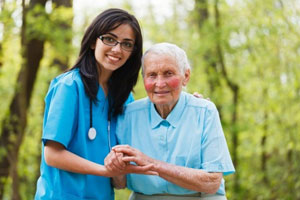LAWS SAFEGUARDING THE LEGAL RIGHTS OF ELDERS IN INDIA
BY: ADITI MARWAHA
India is a country having a big population of elder citizens. We Indians are taught from childhood to respect our elders but unfortunately in the present scenario this is only said and not done. Children are so engaged in their lives that they completely forget about the people who are responsible for their existence and this leads to elder abuse or elders being admitted to old age homes and day care centres. This is a sad part as there are 103.6 million elderly people (60+) living in India today (Government of India, Ministry of Statistics and Programme Implementation, 2016). And according to a recent survey conducted by the NGO Help-Age India in 2014, 50% of elderly people are being abused in their homes. Amongst those who experience abuse, only 59.47% people made an attempt to report the abuse while 40.53% people didn’t report about the abuse they were facing. The reason for not reporting the matters of abuse is that most of these abused elderly people are not aware of the rights and remedies available to them and even if they do, they won’t report such incidences as they do not want to spoil their family’s reputation and they also fear retribution, isolation and neglect from their family members if they go out to complaint.
The various problems that elderly people go through today are:
-
Economic Problems include such problems as loss of employment, income deficiency, and economic insecurity.
-
Physical and Physiological Problems include health and medical problems, nutritional deficiency, and the problem of adequate housing etc.
-
Psycho-social Problem which cover problems related with their psychological and social maladjustment as well as the problem of elder abuse etc.
International efforts to strengthen elders in various countries have been taken like making of an Action Plan on Ageing in 1982 by the General Assembly and various follow-up actions have been taken afterwards like:
(i) In 1992, the United Nations General Assembly adopted the proclamation to observe the year 1999 as the International Year of the Older Persons.
(ii) The U.N.General Assembly has declared “1st October” as the International Day for the Elderly, later rechristened as the International Day of the Older Persons.
(iii) The U.N.General Assembly on December 16, 1991 adopted 18 principles which are organized into 5 clusters, namely-independence, participation, care, self-fulfilment, and dignity of the older persons.
These principles provide a broad framework for action on ageing. Some of the Principles are as follows :
(i) Older Persons should have the opportunity to work and determine when to leave the work force.
(ii) Older Persons should remain integrated in society and participate actively in the formulation of policies which effect their well-being.
(iii) Older Persons should have access to health care to help them maintain the optimum level of physical, mental and emotional well-being.
(iv) Older Persons should be able to pursue opportunities for the full development of their potential and have access to educational, cultural, spiritual and recreational resources of society.
(v) Older Persons should be able to live in dignity and security and should be free from exploitation and mental and physical abuse.
Nationally also the Government has made certain laws to safeguard elders from such an abuse and live with dignity. There are various provisions as well as rights and privileges granted to elderly for their convenience. These are as follows:
Constitutional Protection:
Provisions are mentioned in the Constitution of India for senior citizens of India. Directive Principles of state policy talk about these provisions. Article 41 and Article 46 are the constitutional provisions for the protections of elderly. However the Directive Principles, as stated in Article 37, are not enforceable by any court of law. But Directive Principles impose positive obligations on the state, i.e., what it should do. The Directive Principles have been declared to be fundamental in the governance of the country and the state has been placed under an obligation to apply them in making laws. The courts however cannot enforce a Directive Principle as it does not create any justiciable right in favour of any individual. It is most unfortunate that state has not made even a single act which is directly related to the elderly persons.

Article 41: Right to work, to education and to public assistance in certain cases. The state shall, within the limits of its economic capacity and development, make effective provision for securing the right to work, to education, and to public assistance in cases of unemployment, old age, sickness and disablement, and in other cases of undeserved want.
Every citizen has the right to work over a certain period of time. They cannot be retired from doing their work whether in the private or the public sphere.
Article 41 provides that it is the right of the citizen of India to right to work, to education and to public assistance within the capacity of the state.
Article 46: Promotion of educational and economic interests of Scheduled Castes, Scheduled Tribes and other weaker sections. The state shall promote with special care the educational and economic interests of the weaker sections of the people and shall protect them from social injustice and all forms of exploitation.
Legislative Protections:
Under Personal Laws:
The moral duty to maintain parents is recognised by all people. However, as far as law is concerned, the position and extent of such liability varies from community to community.
Hindu Laws:
Under the Hindu Personal Laws, every Hindu has the obligation to take care of their aged parents who are not able to maintain and take care of themselves.
Hindu Adoption and Maintenance Act, 1956
The Hindu Adoption and Maintenance Act, 1956 empowers our elderly people with legal rights to claim maintenance from their children. Laws and rights under this Act can however be accessed by only Hindus. These laws do not apply to non-Hindu citizens of the country.
Section 20 of the HAMA, 1956, deals with the maintenance of children and aged parents. Under this section, it is clearly mentioned that it is the responsibility of a person to maintain their old and aged parent if they are not able to maintain themselves.
Section 23 of this Act deals with the amount of maintenance that is to be paid to the old and aged parents. According to this section, the court has the discretion to decide the amount or alter the amount already agreed upon to be paid to the aged parents, if it feels that the original amount offered might not be sufficient for their survival.
Under the modern codified Hindu laws, it is not only the son who has the responsibility to maintain the aged parents; such obligation also lies upon the daughter to maintain them. Maintenance can be claimed by both the natural and adoptive parents. However, step-parents, having their own children cannot claim maintenance under this Act.
Muslim Law:
Muslims are also legally entitled to maintain their parents, provided, they have the means to do so.

According to Mulla, a son is entitled to maintain his mother even under “strained” circumstances, if she is poor, even if not “infirm”. The son is also bound to maintain his father if he is earning nothing.
There exists no concept of adoption under Muslim law. Hence there exists no provision for the maintenance of adoptive parents under Muslim law. Christian and Parsi Law:
There is no personal law for Christian and Parsi for providing maintenance to the aged parents. If the parents want to seek maintenance from their children, they can apply through the Criminal Procedure Code to seek maintenance.
Under the Criminal Procedure Code:
The Criminal Procedure Code is a secular law which is applicable to the entire region. This is not for a particular section and is applicable to every citizen of the country.
Section 125 under the Cr.P.C. 1973 deals with the maintenance of old parents. Under this section, old parents, irrespective of their religion can seek maintenance.
The provision for maintenance of parents under the code was introduced for the first time in Section 125(1) of the Code of Criminal Procedure in 1973. As per the code if any person having sufficient means neglects or refuses to maintain his father or mother, unable to maintain himself or herself, a Magistrate of the first class may, upon proof of such neglect or refusal, order such person to make a monthly allowance for the maintenance of his father or mother, at a monthly rate as the magistrate thinks fit, and to pay the same to such person as the Magistrate may from time to time direct.
Section 125 of the Criminal Procedure Code makes it obligatory for sons and daughters, including a married daughter, to maintain their parents.
The Maintenance and Welfare of Parents Act, 2007
This act aims at providing maintenance to senior citizens in the country. It is an Act to provide for more effective provisions for the maintenance and welfare of parents and senior citizens guaranteed and recognised under the Constitution and for matters connected therewith or incidental thereto (Maintenance and Welfare of Parents Act, 2007). It is a ‘go-to’ statute for providing maintenance as it applies to the whole of India except the state of Jammu and Kashmir.
This Act defines a senior citizen as a person who is above 60 years of age and is a citizen of India. Under section 5(1) of this Act, any senior citizen who is also a parent is entitled to get maintenance; where “parent”, according to section 2 means “father or mother whether biological, adoptive or step father or step mother, as the case may be, whether or not the father or the mother is a senior citizen”.

The Act provides provisions for maintenance of child-less senior citizens. Such citizens may be maintained by their legal heir or the person to whom the property maybe transferred after the death of such citizen.
If the senior citizen or parent is incapable, any other person or a voluntary organization authorised by the senior citizen or parent can apply for maintenance on their behalf. This provision is very helpful as most of the senior citizens or parents do not have the time and energy to go around courts and tribunals.
Section 24 of the act provides a punishment for those who, taking care of any senior citizen, leave the senior citizen with an intention of wholly abandoning them to place where no one can find them. Thus, this Act is very useful in protecting the dignity of our senior citizens.
State government has the power under this Act to set up a maintenance tribunal in every sub-division that would have the power to decide upon the level of maintenance. All appeals from the maintenance tribunal would lie in the Appellate tribunal (established at the district level).

The Act caps the maximum monthly allowance at Rs 10,000 per month. The establishment of old age homes has significantly taken off, with at least one old age home per district.
Other Government Policies:
Reverse Mortgages– Under such scheme the senior citizen mortgages his property to a lender in the capacity of a borrower, the lender thereby makes periodic payments to the borrower during his lifetime.
New Pension scheme– This scheme enables an individual to save a certain amount throughout his working life.
Health– The Ministry of Health and Family Welfare provide separate queues for older persons in hospitals for procedures of registration and clinical examination. This is in addition to the concessions offered to them in the treatment of the diseases like cardiac problems, diabetes, kidney problem, blood pressure, joint and eye problem.
Travel- The Indian Railways gives 30% concessions in the ticket prices to all persons aged 60 years and above. It is 50% in case the senior citizen is a woman aged over 60 years. Other facilities like, priority for lower births, separate counter for booking (and cancelling tickets), ramps to roll in wheel chairs at the entry points (in few important stations), specially designed coaches with provisions for accommodating wheel chairs, handrails, and specially designed toilet for disabled older citizen have also been put in place. While travelling by air, most elderly persons are encouraged to board first. Besides this, the Indian Airlines provides 50% concession on purchase of economy class tickets. And, Air India has been offering discount to senior citizen aged 60 years and above on International flights.

Banking– Indian government gives high rate of interests to its senior citizens on certain savings plans which are run by the post offices and other private banks. They can also avail of Income tax rebate up to an income of Rs 1.85 lakhs per annum.
Housing-The Indian government provides housing facilities such as retirement homes and recreational or educational centres. These centres provide older persons with opportunities to spend their free time doing various activities. Most recreational centres have yoga clubs, fitness club, parks, spiritual session, picnic, food fests, libraries, art and craft, music classes and indoor games. It is proposed to allot 10% of the houses constructed under government schemes for the urban and rural lower income segments to the older persons on easy loan.
Miscellaneous- Courts in the country accord priority to cases involving older persons and ensure their expeditious disposal.
According to Sec.88-B, 88-D and 88-DDB of Income Tax Act there are discount in tax for the elderly persons.
Life Insurance Corporation of India (LIC) has also been providing several scheme for the benefit of aged persons, i.e., Jeevan Dhara Yojana, Jeevan Akshay Yojana, Senior Citizen Unit Yojana, Medical Insurance Yojana.
Annapurna scheme is being implemented since 2001 where 10 kgs of food grains are provided free of costs to old destitute people who are above the age of 65 years.

Other Government Policies are National Policy for Older People, 1999, Scheme of Integrated Programme for Older Persons (IPOP), Indira Gandhi National Age Pension Scheme (IGNOAPS), National Programme for the Healthcare for the Elderly (NPHCE).
CONCLUSION
Government of India has made all these provisions under various Personal laws as well as other laws and has also granted benefits through these schemes for their financial support and to maintain their dignity in these crucial years of their lives. However the implementation of these provisions is very poor and should be made stringent as there are many cases which we come across everyday of Elder Abuse and Elderly living in poor conditions without adequate love and care. This is increasing rapidly as there are no solid laws made for Elderly and with the degeneration of joint family system, dislocation of familiar bonds and loss of respect for the aged person, the family in modern times should not be thought to be a secure place for them. Thus, it should be the Constitutional duty of the State to make an Act for the welfare and extra protection of the senior citizen including palliative care.


